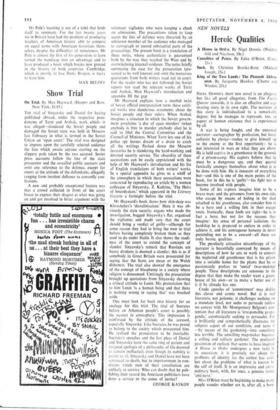Show Trial
On Trial. By Max Hayward. (Harper and Row, New York, $1.95.)
THE trial of Sinyavsky and Daniel for having published abroad, under the respective pseu- donyms of Tertz and Arzhak, work which—it was alleged—slandered the Soviet people and damaged the Soviet state was held in Moscow last February in what is termed in the Soviet Union an 'open court.' The trial was designed to impress upon the carefully selected audience the fate which awaits anyone starting on the slippery path taken by the two accused. Soviet press accounts follow the line of the state prosecutor and the so-called public accusers and omit any reference to the defence, except for sneers at the attitude of the defendants, allegedly ranging from insolent defiance to cowardly con- fessions.
A new and probably exceptional feature was that a crowd collected in front of the court house to express their disgust at what was going on and got involved in bitter argument with the volunteer vigilantes who were keeping a check on admissions. The precautions taken to keep secret the line of defence were thwarted by an unknown member of the audience who managed to stenograph or record substantial parts of the proceedings. The present book is a translation of these notes, whose authenticity is guaranteed both by the way they reached the West and by overwhelming internal evidence. The notes briefly summarise the case for the prosecution (pre- sumed to be well known) and omit the numerous quotations from both writers read out in court. For the reader who has not followed the Soviet reports nor read the relevant works of Tertz and Arzhak, Max Hayward's introduction and appendix fill the gap.
Mr Hayward explains how a morbid twist of Soviet official interpretation turns these satiri- cal works into slanderous statements about the Soviet people and their rulers. When Arzhak imagines a situation in which the Soviet govern- ment proclaims 'a day of open murders' (when anybody is free to murder anybody else) he is said to libel the Central Committee and the Council of Ministers. When Tertz lets one of his police spy heroes dream of a drain to catch all the writings flushed down the Moscow lavatories he is slandering the hard-working and devoted security service. The absurdity of these accusations can be easily appreciated with the help of Mr Hayward's introduction and his list of English translations of both writers' works. In a special appendix he gives us a whiff of the atmosphere in which these accusations were concocted by reproducing an article by a woman colleague of Sinyavsky, Z. Keclrina, The Heirs of Smerdyakov,' which appeared in the Literary Gazette a fortnight before the trial.
Mr Hayward's book shows how skin-deep was Khrushchev's 'clestalinisation.' Here it was ob- viously the state security organs who made the investigation, bugged Sinyavsky's flat, organised the vigilantes and made sure that the court should bring a verdict of guilty—although for some reason they had to bring the men to trial before having completely broken them as they used to do under Stalin. It also shows the readi- ness of the court to extend the concepts of slander. Sinyavsky's remark that Russians are heavy drinkers is deemed a slander; this is as if somebody in Great Britain were prosecuted for saying that the Scots are mean or the Welsh dishonest. The trial also showed the emergence of the concept of blasphemy in a society where religion is denounced. Untiringly the prosecution' brought up quotations from Sinyavsky showing a critical attitude to Lenin. His protestation that to him Lenin 'is a human being and that there is nothing wrong in saying that' was brushed aside.
One must look far back into history for an analogy for this trial. The trial of Socrates before an Athenian people's court is possibly the nearest in atmosphere. This impression is reinforced by the attitude of the accused, especially Sinyavsky. Like Socrates, he was proud to belong to the society which prosecuted him. He realised the prosecution to be inevitable. Socrates's speeches and the last pleas of Daniel and Sinyavsky have the same ring of patient and resigned apologia of a philosophy of life doomed to remain ineffectual, even though its nobility is patent to all. Sinyavsky and Daniel have not been sentenced to death, but to imprisonment in con- ditions which men of their constitution are unlikely to survive. Who can doubt that by pub- lishing their record the American publishers have done a service to the cause of justice?
GEORGE KATKOV


































 Previous page
Previous page